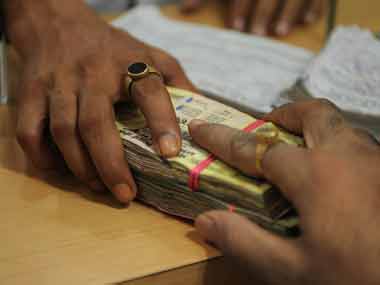Think of it as a 50-over one-day cricket match, with each day equivalent to an over. The game has just begun. The government of India, popularly known as Modi sarkar, has just created a 50-day hawala window for those with black money – albeit in a loose sense. The term hawala is usually used for illegal trade in foreign exchange going back to the times before 1993 when India had tight controls on who could buy and sell foreign exchange. This created a black market in the US dollar and other “hard” currencies. [caption id=“attachment_2773764” align=“alignleft” width=“380”] AFP[/caption] Now, imagine a similar scenario in the old 500 and 1,000-rupee notes, which the government demonetised on Wednesday. Modi fans describe it as a “surgical strike.” Less than 48 hours after the announcement, it seems the scheme, like the strike, is controversial for its timing, manner and style. Soon after the announcement, an active government reporter tweeted: “Heard in the corridors of a sarkari office,“Two (sic) din ruk jaiye. Hawala ke rates aa jaayenge.” (Wait for two days. The black rates will come). The prediction has almost come true, though the rates are not exactly known yet. This because the government has given official indications of what it intends to do, giving market players enough information and a chance to “discover” the market rate through what might begin with back-of-the-envelope calculations and progress to a more dynamic mechanism. Here’s how. Revenue Secretary Hasmukh Adhia said on Wednesday that
cash deposits of Rs 2.5 lakh and above may attract tax and also a 200 percent penalty in case of income mismatch. Any mismatch will be treated as tax evasion. He also added that small businessmen, housewives, artisans and workers had some cash lying at home should not be worried. By saying that the government will get reports of deposits above Rs 2.5 lakh and above, Adhia only implied that those below that amount are likely to stay below the taxman’s radar. Actually, Adhia took the surprise out of the game and set the ground for the discovery of hawala rates and the manner in which might happen through a distribution chain that might create itself over the 50-day window, just as batting partnerships happen through an innings in a one-day cricket match. Picture this. An East Delhi gym is reported to have announced that it is ready to accept demonetised Rs 500 and Rs 1,000 notes to attract new members. Gold prices also shot up on Wednesday – the yellow metal being the easily fungible global alternative to foreign exchange. All you have to do now is to connect the dots. Precisely the people who Adhia mentioned – small businessmen and artisans in particular – may easily become the front men and women for a 50-day hawala game much in the way tourists and travellers were historically used by hawala traders in Dubai, Bangkok, HongKong and other centres. All they have to do is to take some risk and have reasons ready for the taxman. Done within limits, that should not be an issue Gyms, salons, clubs and other enterprises may offer long-term memberships against old cash and whitewash it with some smart legal payment mechanism, much like real estate dealers have in the past combined white-plus-black deals. There are also early reports out on how chartered accountants bring together rich firms with unexplained cash with others having a cash shortage. Jewellers and gold dealers may also perform much the same role as CAs by using their enterprise to become intermediaries in exchange for higher gold prices. Those with cash hoards will simply declare to banks only that much cash which will not raise eyebrows in the income-tax department. They may “sell” the rest of their cash at market-discovered money-laundering rates. This is akin to the black market premium rates for foreign exchange. Only, in this case, this would be a discounted rate for rupees. What the hoarder does is to incentivise the buyer for fronting the risk and add a premium for avoiding harassment at the hands of income tax officials. Watch out for gold dealers and small businesses active in the 50-day game, and expect some strokeplay as the slog overs arrive. India, after all, is the land of improvised innovation, or jugaad. With the Reserve Bank keeping a smaller window open for three more months, the game might get stretched a bit more. (The writer is a senior editor and journalist who has worked for Reuters, Economic Times, Hindustan Times and Business Standard. He tweets as @madversity)
The government of India has just created a 50-day hawala window for those with black money – albeit in a loose sense. Modi fans describe it as a “surgical strike.” Less than 48 hours after the announcement, it seems the scheme, like the strike, is controversial for its timing, manner and style.
Advertisement
End of Article


)
)
)
)
)
)
)
)
)



